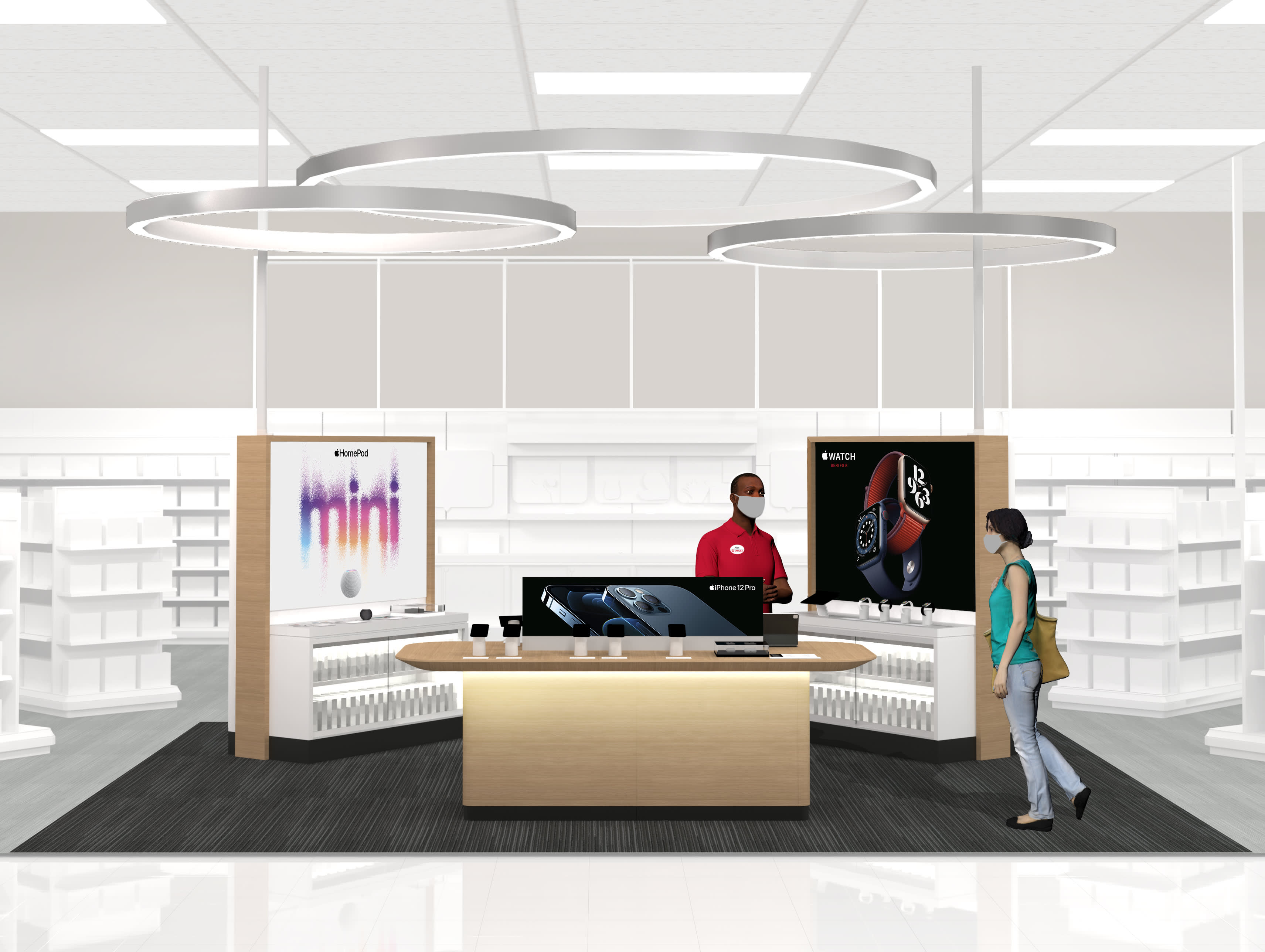
Target will open 17 mini Apple shops inside of its stores this month, with plans to expand them to other locations.
Target
Target wants to give shoppers another reason to skip trips to the mall: It’s adding mini Apple stores to some locations, with more space devoted to iPhones and other popular gadgets.
The retailer said Thursday that the shops will open in 17 Target stores this month, and it plans to expand to more locations in the fall. Target already sells Apple merchandise, but the shops will double the tech company’s footprint inside of each store, include more accessories and have staff with specialized training from Apple. The brand’s products have a new look on Target’s website, too.
Target Chief Growth Officer Christina Hennington said the dedicated area will catch customers’ eyes and make its sales floor more experiential. It will also have videos and displays that are more engaging, she said.
“When we have something that is uniquely compelling and different, whether it’s in the assortment, how the experience is brought together or service — which is a big component of what we are talking about with the Apple experience — it draws our guests in, which then drives traffic, and of course sales over time,” she said.
In a statement, Apple said the company looks forward to “continuing to work with Target on exciting new ways to serve customers in-store and online.”
For some consumers, a stop at Target’s stores has taken the place of hours-long shopping trips to multiple retailers during the pandemic. The big-box retailer has seen significant sales growth because it stayed open as an essential retailer in the early part of the global health crisis and then capitalized on convenience with its wide range of merchandise, curbside pickup and third-party delivery service Shipt.
That has translated to $6 billion in market-share gains as of the end of the third quarter, the company said, citing third-party and internal research. Its stock price has soared, too. As of Wednesday’s close, Target shares are up about 64% over the past year. Its market value is $93.68 billion.
After its huge quarterly gains, the discounter will face challenging comparisons. Consumers could return to old habits as the pandemic wanes, like returning to multiple stores instead of consolidating trips at Target. Some investors have already grown skeptical of stocks that have benefited from stay-at-home trends. The company plans to report fourth-quarter earnings and host a virtual investor day on Tuesday.
Target’s leaders have said they can sustain the upward trajectory by taking sales from struggling retailers and offering unique merchandise that grabs customers’ attention and more of their budgets. It has launched private labels such as athleisure line All in Motion and limited-time collections with beloved brands such as Lilly Pulitzer and Hunter.
It has also tried Disney shops in some stores and featured Levi’s jeans and apparel in a dedicated area. It will open hundreds of scaled-down Ulta Beauty shops later this year with curated products and trained makeup and skin-care professionals.
With its latest “shop in shop,” Target will feature Apple — a brand that’s a draw for shoppers and a common hangout spot at malls. It will resemble the tech company’s stores with new lighting and lowered tables where customers can try out Apple products.
It will not have an Apple trademark — the “Genius Bar” — where customers can get concierge-like tech support. Hennington said Target hasn’t ruled out adding that in the future.
Hennington declined to share financial terms of the deal. She said it has been in discussions with Apple about the idea for months and collaborated with the tech company to pick the locations for the shops.
She said technology played a central role this year in keeping people safe and entertained. She said the retailer sees it as a growth category, particularly because of Apple’s following among customers.
Sales in Target’s electronics category grew by 50% in the third quarter and more than 20% during the holiday season compared with the same period a year earlier.
Nearly a decade ago, the retailer tested a concept to showcase Apple in some stores with more prominent display, but the company said this new effort is a separate strategy and goes much further than swapping out signage.
Here’s a list of the first 17 Target locations that will have the Apple shops:
- Monticello, Minn.
- San Jose, Calif.
- Oklahoma City
- Allen, Texas
- Hurst, Texas
- Austin, Texas
- Irving, Texas
- San Antonio
- Gainesville, Fla.
- Orlando, Fla.
- Clearwater, Fla.
- Miami
- North Wales, Pa.
- Newark, Del.
- Woburn, Mass.
- Nashua, N.H.
- Latham, N.Y.



